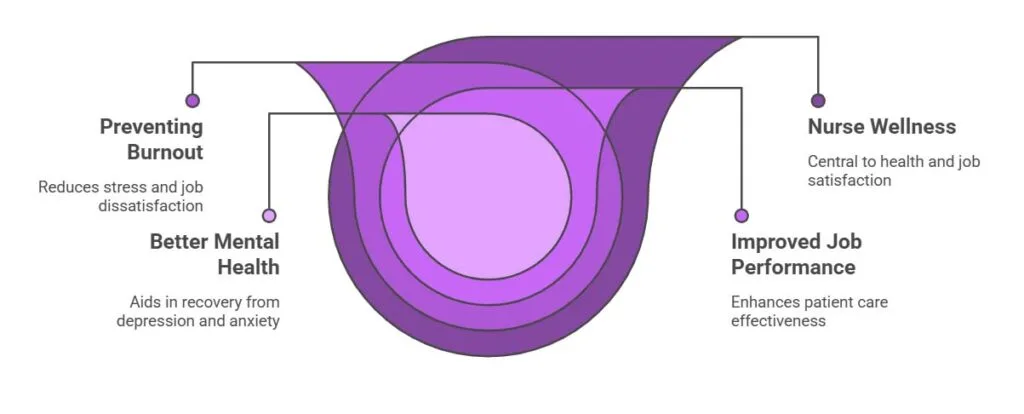Nursing is a benefit, but it causes the nurses to be physically and emotionally exhausted. Nursing staff always gives their patients the utmost care, kindness, and expertise, but are still under intense time pressure and overtime hours. In this environment, it is common to find nurses overwhelmed by work and suffering from burnout and exhaustion.
Still, the importance of self-care and nurse wellness cannot be underestimated. Therefore, self-care and nurse wellness are the most essential parts of sports; health gives good performance. Step by step, the nurse and doctor immediately shift to care by referring to the means of joy evaluation. Let’s start the discussion with “Recharge, Refocus, and Reclaim Your Energy” by considering a nurse’s perspective on her trauma-informed treatment.
Introduction to Nurse Wellness
Nurses are the mainstay of healthcare systems, working non-stop to ensure their patients are well-taken care of. However, when dealing with the job’s constant emotional and physical challenges, they might find it hard to stay balanced and feel well. Nurse Wellness among nurses is not a privilege. Instead, it is a prerequisite. They are unique individuals of great importance who can perform better for their patients and maintain their psychological and physical well-being. Whenever you could be hired as a slightly autonomous caregiver with moderate levels of intra-mood and avoidance, try to pass your coping skills to patients by asking about the sample scale or playing music.
We will find our discussion of easy and practical ways to help nurses recharge, refocus, and stay energized, fun, inexpensive, and easy to do. By following these steps and making them yours, your health, workplace satisfaction, and overall job performance will skyrocket.
The Importance of Nurse Wellness

Nurses’ health and job satisfaction can be achieved if they are more concerned with their nurse wellness. Nurse Wellness is how to achieve a balanced, healthy, fulfilling life.
It means understanding the behaviors that do not contribute to a healthy life and adapting them to behaviors that do, such as proper nutrition, exercise, not smoking, not drinking alcohol, avoiding risky behaviors, etc. Occupational health is maintained since the nurses who have it practice it.]
- Preventing Burnout: The nursing stress of dealing with physical and mental demands when not caring for oneself creates burnout and job dissatisfaction.
- Improved Job Performance: If you sleep enough and eat right, you can care for your patients more effectively.
- Better Mental Health: A complete understanding of the causes of depression and anxiety allows people to get a more precise treatment and complete recovery.
Nurses who integrate nurse wellness strategies into their daily lives will not only stay burnout-free but also boost their job satisfaction and ensure better treatment of patients.
Recharge: Physical Nurse Wellness Strategies

Maintaining a high level of nurse wellness is the first essential step when one’s body is fully charged. With the body’s demands of being constantly on the move only, treating one’s body with the same regard of preserving it through self-care is essential for nurses to sustain an ever-high level of energy.
1. Adequate Sleep and Rest
These days, sleep and rest are the body’s ways of recovering. Rest is a must, especially for nurses who work 12-hour shifts or more. Here are some tips for sleeping better:
- Create a Consistent Sleep Schedule: Go to bed and wake up at the same time every day, even on days off.
- Create a Relaxing Environment: Make sure that there is none or almost no light in your bedroom, and take a cool rest before you go to bed.
- Consider Power Naps: If you are a nurse working a night shift, a 20-30-minute nap is a good way to get enough sleep and still be productive.
2. Balanced Nutrition
The body is the engine that needs fuel to run. For this, nurses need a balanced diet that can consist of:

- Healthy Snacks: To reduce the chances of eating junk food during a busy day, it is advisable to pack a lunch bag with fruits, nuts, and granola bars.
- Stay Hydrated: The body may not function properly without appropriate hydration, resulting in more fatigue and less thinking. Having at least a bottle of water is always a good idea.
- Meal Prep: When planning and cooking meals, always think ahead to ensure they are well-proportioned and perfectly well-suited for you, even when tight.
- Walk During Breaks: Other than that, I suggest you use this time to calm down and walk, stretch, or do light physical activities to rejuvenate.
- Work Out After Shifts: Spend a little time doing a quick and powerful body workout after work, and you will feel ready to relax and release stress.
- Breathing Exercises: Use meditation to help stay calm and strengthen your commitment to not overthink and worry.
- Mindfulness: If you feel that your body is clear of thoughts and fully present, that is precisely when you practice mindfulness meditation.
- Journaling: Through writing, let go of the negative energy you have built up inside you by reflecting on your experiences throughout the day.
- Learn to Say No: It’s okay to decline additional tasks or overtime if it puts your best at risk.
- Set Work-Life Balance: By keeping a boundary between the work atmosphere and the personal life environment, prevent the transfer of the work-stress to the home.
3. Regular Exercise
Gym helps to keep the body in a good condition and raise the mood.
- Walk During Breaks: You should spend a little time on a walk, breathing exercises, and doing gentle exercises to recover.
- Work Out After Shifts: In the evening, going to a gym will refresh you, help you relax, and relieve stress.
Refocus: Mental and Emotional Nurse Wellness

Mental and emotional nurse wellness was almost always paid little attention. Nurses are frequently subjected to a vast range of emotions and tense situations. By learning methods to refocus and ease emotions, they can stay grounded.
1. Stress Management Techniques
Nurses should constantly use stress-reducing activities to handle and cope with the job’s emotional difficulties. Breathing exercises are one of the best techniques to deal with:
- Breathing Exercises: Concentrate on meditations that help relax the mind and reduce tension.
- Mindfulness: Try deep belly or Kundalini breathing to reach your soul and find inner peace.
- Journaling: Record the most important moments of your day, the ones that made you feel the happiest or those that caused you a little excitement, letting go of your negative thinking.
2. Setting Boundaries
Discipline is a key aspect of preventing the excessive use of oneself. Medical specialists should decide on certain limitations in their personal lives to have a good mix of work and personal life:
- Learn to Say No: Tell your supervisor your reasons for not saying yes, and in doing that, also propose sharing duties with your colleagues.
- Set Work-Life Balance: To avoid transmitting work-based anxieties to your private relationships, create a clear line between the working and free time areas.
3. Seeking Support
Support to facilitate emotional stability is crucial to mental health. Nurses must ask for help from their friends, colleagues, or therapists whenever needed. Support groups that are either in-person or online can be a great place to exchange experiences and gain insight.
Reclaim Your Energy: Rebuilding Your Sense of Purpose

It is standard for nurses to feel stressed and despairing without knowing why they do this job. Recovering your energy requires you to regain your love of nursing and experience a playful atmosphere at your workplace.
1. Reconnect with Your Why
Think back to why you became a nurse initially. Building a stronger bond with your purpose can emerge even as you have the opportunity to reflect on all of the positive patient encounters, the times when you made a difference, and knowing that your work is valuable.
2. Pursue Professional Development
Further your learning and professional growth. Acquire new capabilities by participating in courses, certifications, or mentorship programs. This will not only raise your confidence level but will also stir up your passion for nursing.
3. Celebrate Your Achievements
Take the time to give yourself a pat on the back for your accomplishments, no matter how small. Be it the successful finishing of a demanding shift or getting positive feedback from a patient, appreciating your achievements brings out a feeling of contentment and pride.
FAQs on Nurse Wellness
How can I avoid burnout as a nurse?
One must first prioritize self-care, set boundaries, practice stress management techniques, and ask for support from colleagues or counselors when necessary.
What are the top food choices for nurses during a shift?
The best foods to focus on for nurses are balanced meals consisting of low-fat protein foods, whole grain products, and fresh fruits and vegetables. Healthy snacks such as almonds, yogurt, and granola bars can also help to keep energy levels stable during a shift.
How can I manage stress while working long shifts?
Managing stress includes deep breathing exercises, singing, awareness of the present moment, and short walks during breaks. Moreover, mindfulness meditation, like deep breathing, being in the moment while meditating, and taking little walks outside the unit, can reduce stress and increase energy.
How important is sleep for nurse wellness?
The answer is that sleep is essential for maintaining good physical health and nurses’ recovery. Nurses need to rest well, which is one of the factors that can calm your mind, and one of the ways to fix your sleep schedule.
Can exercise help boost energy during long shifts?
Regular workouts are the best way to improve overall health and stamina. Taking short walks and stretching before, during, or after work can make one feel comfortable, pass energy, and perform better even during long shifts.
Conclusion
Nurse wellness is critical to thriving with a healthy, productive, and fulfilling career in healthcare. It is only by taking care of their physical, emotional, and mental health that nurses can fulfill them and consequently giggle off the stress and rediscover joy in their work. Gaining new energy, focus, and time is the mammoth task you are asked to do for your health and those of others you care for. Nurse wellness should be your top concern today, and professional and personal improvement will be noticed without a doubt.



